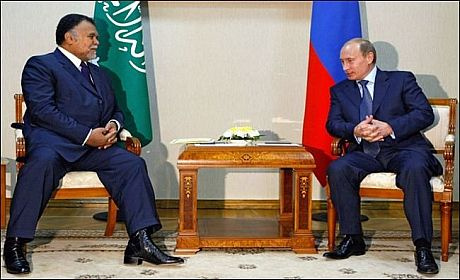Bandar’s Unachievable Objectives

It has been reported in the Lebanese media that Bandar’s hellish plan in Lebanon was revealed. In order to compensate for its failure in Syria, Saudi Arabia is attempting to show its force and disrupt the stability and security of Lebanon to attract public opinion in the West. What are Sultan’s activities in Lebanon?
The activities of Bandar bin Sultan in Lebanon can be summarized in two main issues:
1-In the Lebanese dimension, he supports the al-Mustaqbal group which is the most important group which supports Saudi Arabia in Lebanon. Saudi Arabia supports this group politically and financially.
2- Saudi Arabia supports the Syrian opposition that is stationed in Lebanon. They reside mainly in Tripoli, Wadi Khaled and regions which have a relatively traditional texture. Many of the Salafi groups that cooperate with them and are Lebanese are also politically and financially supported by Saudi Arabia. Therefore, Saudi Arabia’s measures in Lebanon are basically enforced in these two areas by Bandar bin Sultan and huge financial support has been allocated to support these groups.
It has been reported that Bandar bin Sultan has supported the armed groups in Iran’s Baluchistan province and provokes the Arabs in the province of Khuzestan against Iran’s government. How would you interpret these activities and what are his objectives behind such measures?
Right now, Bandar bin Sultan makes efforts to expand the rift between the axis of resistance and the axis compromise under religious titles. In other words, Bandar bin Sultan’s attempts to spread and intensify religious differences are not only limited to Syria, Lebanon, and Iraq, but he also tries to spread this issue in Pakistan, Afghanistan, and even Iran. That is why such diverging and destructive activities on the part of Sultan must be carefully studied. Bandar bin Sultan was Saudi Arabia’s ambassador to the US for 33 years and has close relations with the neo-cons and the Christian Zionists and reports show that he has visited Israel several times during the last year. This approach indicates that this person is in the service of the West and Israel, thus, he would certainly take measures against the people of the region and the independence of the regional countries. The countries of the region must react against such policies and create obstacles for them.
Bandar bin Sultan has also visited Moscow and it is said that he intends to open the gates of direct strategic cooperation between Russia and Saudi Arabia. This is while the Russian President, in response to the explicit threat of Sultan, has warned Riyadh that Moscow will prevent the West’s military intervention in Syria and break the legs of the Salafis who threaten the security of Russia. How would you assess Moscow-Riyadh relations?
Saudi Arabia does not have close relations with Russia. But at the same time it attempts to separate Russia from the axis of resistance. The reason is that Russia supports Iran and Syria at the present time and its position is quite clear. Saudi Arabia, on the other hand, attempts to change this country’s position through delivering financial and economic possibilities and through the purchases it makes from Russia. But Russia will not change its positions with Saudi Arabia’s billion dollar purchases of its arms. In the end, Russia has given a negative response to Bandar bin Sultan and he has returned from Moscow with empty hands.
Following the visit made by Sergey Lavrov and Sergey Shoygu, the Russian Foreign Minister and Defense Minister, to Egypt, Bandar bin Sultan intends to establish a triangle between Saudi Arabia, Russia, and Egypt. What are his objectives behind this plan and is the establishment of such a triangle possible, in your opinion, in general?
I assume that these are issues that cannot be talked about with certainty. The issue that, when Egypt buys arms from Russia with Saudi money, it will automatically create unity and coalition between Russia, Saudi Arabia, and Egypt is not acceptable. Big countries would not sell themselves to small countries like Saudi Arabia and would not limit their objectives. Russia seeks to gain influence in the entire world, hence, how could one assume that it would become dependent on Saudi Arabia or its allies in the region? Therefore, it seems that Russia could, under no condition, be influenced by Saudi Arabia or even other powers at the regional level.
It is said that the issue of Iran-Saudi relations was one of the issues that were discussed in John Kerry’s visit to Saudi Arabia and Saudi Arabia’s dissatisfaction about the progress made in the nuclear negotiations has been heard. What is your assessment of Bandar bin Sultan’s attempts to create obstacles in these negotiations?
Following the 33-day war, different groups have clearly been defined and Saudi Arabia has placed itself in the Israeli front and against the axis of resistance. Right now when the West has reached the conclusion that the crisis must be resolved politically, Saudi Arabia is faced with crisis. Since the beginning of the crisis in Syria, Saudi Arabia and Qatar have said many times that the government of Syria would be overthrown within two to three months. This is while two years and ten months have passed and nothing has happened and they were not able to make such changes in that country. That is why the West has come to the understanding that what countries like Saudi Arabia and Qatar had said were miscalculations. They still pursue these miscalculations but the West has ignored this analysis. Therefore, Saudi Arabia’s attempts to confront such policies cannot last long because Saudi Arabia depends on the US and if the US reaches a new belief, Saudi Arabia must certainly adapt itself to the new US policies and it cannot act separately and against the US. That is why this is a wrong assumption that Saudi Arabia could make serious changes in the existing equations of the region.

